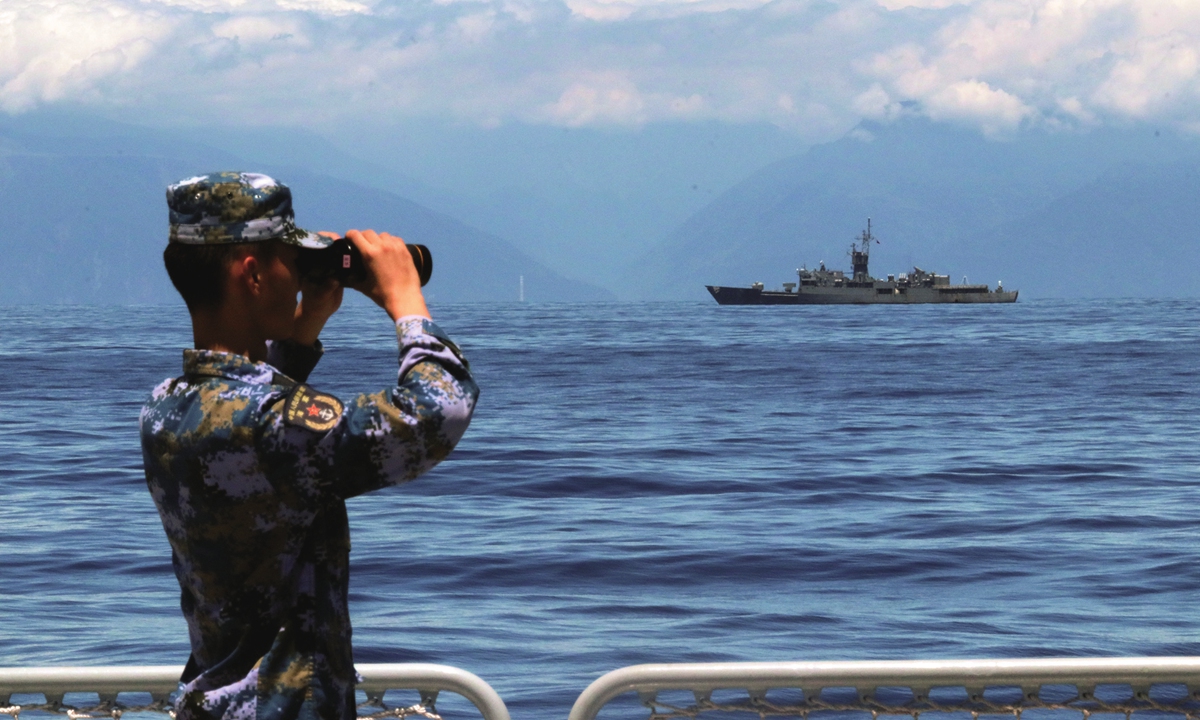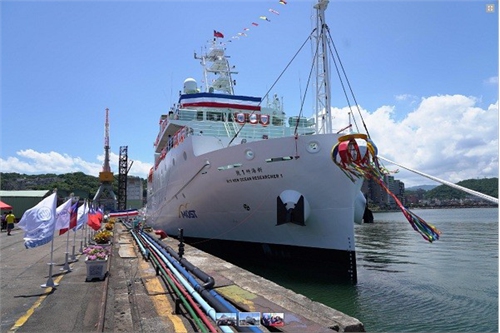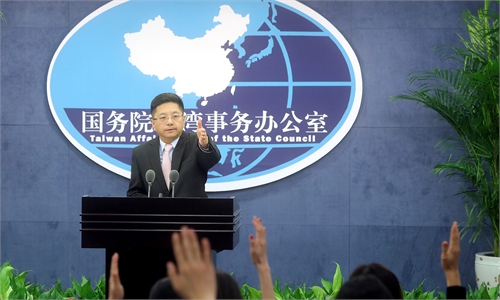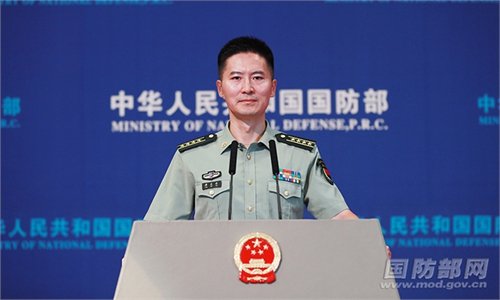Another provocation on Taiwan question: Japan plans new joint command to manage armed forces in attempt to 'unleash military development'

A People's Liberation Army(PLA) soldier looks around with a telescope on August 5, 2022, as the Navy of the PLA Eastern Theater Command continues drills the waters around the island of Taiwan. Photo: Xinhua
In a series of provocative moves on China's red line - the Taiwan question, Japan is reportedly eyeing establishing a new joint command and a new position of commanding officer to oversee its three Self-Defense Force units and better coordinate with the US military in emergencies. Chinese observers warned on Sunday this will be part of Japan's dangerous attempts to unleash its military development.
Japanese media outlet Nikkei reported on Saturday that the restructuring could take place as soon as in 2024 "as the nation remains vigilant for any potential crisis in the Taiwan Straits." The upcoming restructuring comes at a time when Chinese observers have warned there is a growing dangerous perception within the Japanese government that " a Taiwan emergency is a Japanese emergency."
According to Nikkei, the new officer will oversee the operations of the Ground, Maritime, and Air Self-Defense Forces, and closely communicate with his US military counterparts.
Currently, the Joint Staff Office of the SDF commands all three forces and is overseen by the chief of staff, the sole person in charge of communication with the prime minister and the US military. This reorganization is meant to ease the chief of staff's workload by creating a new command position under him, with this officer overseeing the operations of all three forces. The officer will also coordinate moves between the SDF and US forces in emergencies, Nikkei revealed.
To that end, the Japanese government must first amend the Self-Defense Forces Act. Once the amendments are made, a rapid-response system will be established by 2027, Nikkei said.
The report noted the plan will be included in three security-related documents to be revised at the end of the year.
The three documents include the National Security Strategy, which could radically change Japan's highly restrictive and exclusively defensive postwar security policy, Asahi Shimbun said in an editorial in September.
With the Japanese government turning more and more conservative, observers condemned right-wing politicians for playing the "Taiwan card" and sensationalizing security concerns. They are trying to rationalize the country's goal of unleashing its military development, amending its pacifist constitution and finally become a "normal country," which will threaten the regional and world peace and stability, observers warned.
The establishment of a joint command, which apparently targets China, shows that Japan is speeding up its arms expansion and war preparations through attempts to revise national security documents and even its pacifist constitution amid the overall China-US strategic rivalry, Da Zhigang, director of the Institute of Northeast Asian Studies at Heilongjiang Provincial Academy of Social Sciences, told the Global Times on Sunday.
Targeting the situation across the Taiwan Straits, the potential joint command, when established, will add more uncertainty to the region, which exposes Japan's wishful thinking of hindering China from solving the Taiwan question in the future, Da believes.
Observers said that the joint command is seen as part of Japan's ambitious and even aggressive defense adjustments.
Asahi Shimbun revealed that the Kishida administration is planning to rewrite the National Security Strategy along with two other defense policy documents - the National Defense Program Guidelines and the Mid-Term Defense Program.
The three documents will redefine the direction, nature and mode of Japan's national security in the following years, for example, how to integrate and enhance its defense forces, how to increase funds in key areas and how to match short- and mid-term defense cooperation with the whole nation's security strategy, Da said.
Japan's defense adjustments echo the US' "Indo-Pacific Strategy" which focuses on "integrated deterrence" with US allies to contain China's peaceful development, Chinese observers said.
They believe that the US is indulging Japan over loosening restrictions on the latter's military development to make Tokyo a stronger pawn in the Asia-Pacific to sabotage China's reunification process.
They warned that the US will continue to create tensions on the Taiwan question to provide excuses for Japan to increase its military readiness.
Da believes China should get fully prepared to counter the US and Japan's provocations on the Taiwan question on which China will allow no arbitrary or brutal interference.
China's Ministry of National Defense on Thursday urged Japan to honor its political commitments, refrain from interfering in the Taiwan question, and stop playing up the so-called China military threat after the Japanese government was reported to be considering hyping the Taiwan question in its National Security Strategy, which is likely to be revised by the end of 2022.
Senior Colonel Tan Kefei, spokesperson for the ministry, said at a regular press conference on Thursday that for some time, Japan has deliberately hyped up China-related issues like the Taiwan question, grossly interfered in China's internal affairs, and played up the so-called China military threat, which is irresponsible and has ulterior motives.




